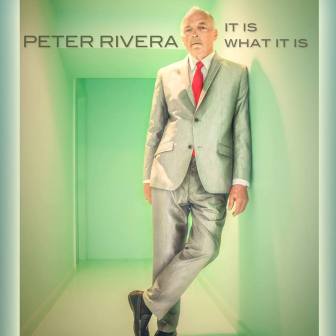
Peter Rivera (Rare Earth, solo) • Hit Channel
HIT CHANNEL EXCLUSIVE INTERVIEW: September 2017. We had the honour to talk with a great musician: Peter Hoorelbeke aka Peter Rivera. He is best known as the original drummer and lead vocalist of Rare Earth, the first successful white band of Motown. They had three groundbreaking hit singles: “Get Ready”, “(I Know) I’m Losing You” and “I Just Want to Celebrate”. After his departure from Rare Earth, Peter followed a solo career and also formed HUB and The Classic Rock All-Stars. His autobiography “Born to Wander” is a must-have for the fans of Rare Earth. His latest album “It Is What It Is” was released in December 2014. Read below the very interesting things he told us:
What was the idea behind the song “Look What We’ve Done”?
Well, I grew up in Detroit, Michigan and my father, my uncles and my cousin, they all worked at these factories all my life. A few years ago, automobile factories started closing down. Detroit was suffering a lot and jobs were gone. My friend from Detroit told me: “You’ve got to write a song about this. Look what we’ve done here?” So, one day I got an idea to write a song called “Look What We’ve Done”. My son and I, went to Detroit and he filmed all that. Have you seen the video of it? My son did all the video work and of course I had to sing. We just wanted to complete the song. I tried to give it out to some political officials here in my country, but nobody really wanted to play that. I think it was timely and good.
Are there any touring plans for the near future?
I’m talking with a new agent who seems to have some really good ideas. I’m doing some shows now with the Raiders, Paul Revere & the Raiders and Mitch Ryder from Detroit. We’re doing some shows and I’m trying to get over to Europe. We’ll see. Maybe this next year will be a good time for that. We are working on that, right now.
Was it a difficult process to write your autobiography “Born to Wander”?
I was on an airplane one time and I said to myself: “You had to write a book”. So, I decided to write about Rare Earth for the beginning right up until Rare Earth broke up, back in the early ‘80s. So, I wrote the book and it tells the story of how we were formed and all the other things that we did. I did not want to put any bad things in the book about any of the players because they have wives and children, so I didn’t really try to put dirty things, if you know what I mean.
What was it like to be the first successful white band in Motown Records?
Motown had black artists like Marvin Gaye, Stevie Wonder, Smokey Robinson… They treated us really good: They welcomed us in, we had fun with them, we were laughing at some of them and they were nice. The Motown record corporation was a little hard to deal with because some of them thought that we were invading the territory of Motown. We were a rock band and they didn’t really have rock music then. They had just RnB. It was OK. We were lucky to get a contract back in those days.
There were many outside songwriters in Rare Earth albums. Do you wish you had done more songwriting in Rare Earth?
Motown had a structure: The producers produced, the writers wrote songs and the artists sang those songs. So, when we got to Motown we had a few songs of our own and they really were not too interested. They wanted us to use the Motown writers. “I Just Want to Celebrate” and “Hey Big Brother” were written by Nick (ed: Fekaris) and Dino (ed: Zesses) and they were writers of Motown. They had also written other hit records: “I Will Survive” by Gloria Gaynor, Peaches & Herb’s “Reunited”… Anyway, our songs came from some writers. We wrote songs that are on our albums but we didn’t write the single version.
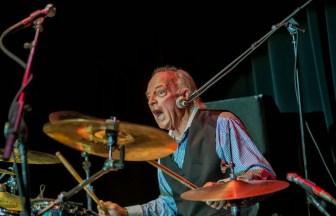 Did you feel a lot of pressure after the first three successful singles of Rare Earth?
Did you feel a lot of pressure after the first three successful singles of Rare Earth?
We had three hit singles and then we wanted to try to have a fourth and more. So, we did decent songs that didn’t turn out that great and the band was on the road a lot and there was a lot of trying to do new songs. Eventually, we wanted to work on new songs but members of the band were involved in a little bit of drugs and alcohol and it was very hard to have a good rehearsal. It’s very hard to do that. Eventually, we didn’t have any more hit records. We had “Get Ready”, “Born to Wander”, “(I Know) I’m Losing You”, “I Just Want to Celebrate” and “Hey Big Brother”. There were albums that selling good but we didn’t have hits.
What memories do you have of the California Jam in 1974?
That was a very-very amazing show. There were -I think- 300.000 people there and we had to fly from the hotel on a helicopter up over the crowd and backstage. It was just a great show. We were on on the early morning about 9.30am. Three days of music, it was a lot like Woodstock but it was in California. It was a great show. We had a good time. It was a hot day and everyone was excited, so when I hear our songs back… we were playing pretty fast (laughs).
Had you realized that it wasn’t very usual in the early ‘70s to be a lead singer and drummer at the same time?
It wasn’t. It was unusual. There was Phil Collins, there was Don Henley (The Eagles) and a couple of others and I was one of them. I learned how to sing and play the drums because nobody else in the band could play the drums while I came out and sang. So, I had to play the drums and sing too. I started out singing and little by little learned how to do more and more. After a while, I just sang while I played. It’s not more difficult than a guitar player who sings or a keyboard player who sings. For me, it was easy. It still is easy. It’s not a terribly hard work. That’s what I do.
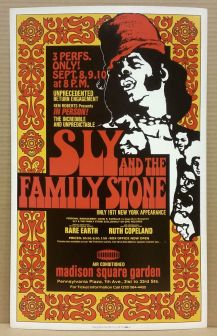 Were you anxious about black audience’s reaction to your music?
Were you anxious about black audience’s reaction to your music?
Because we were with Motown, when we started out with our first record, in a lot of our shows in the beginning, were mostly black audiences and we slowly started to play in colleges and then we were playing for everybody. They called it “crossover”. I don’t care what the colour of anybody is, if they were having a good time, that’s all that matters to me. I grew up in Detroit, there were problems sometimes but overall people are people: There are good ones, there are evil ones, there are kind ones. So, I just like to play. I don’t like to give in to the politics, racial stuff.
Did you enjoy touring with Sly and the Family Stone?
Yes, that was a lot of fun. We played at Madison Square Garden. We played five nights, it was sold-out and it was just a great-great time. The crowd was great and the show came out good. That was one of the highlights throughout the years: Madison Square Garden with Sly. I really liked Sly a lot. I’m sorry that he kind of fell off the wagon.
In your opinion, what made the music scene of Detroit so influential?
Motown of course was in Detroit. There were a lot of things happening there. There were other people in Detroit like Mitch Ryder, MC5, Grand Funk Railroad and Ted Nugent. They made a lot of great stuff. That was the key element of a real music scene. That changes a lot. There was the Seattle thing (ed: grunge), Nashville, New York and in of course Detroit. Everybody gives it a try, I guess.
Were you surprised when Metallica covered “I Just Want to Celebrate”?
I just thought: “Well, ok. Thank you. That’s nice”. I don’t really have too much of an opinion. I like when somebody else is doing our songs. For a good twenty years, they stole us that song. Just everybody.
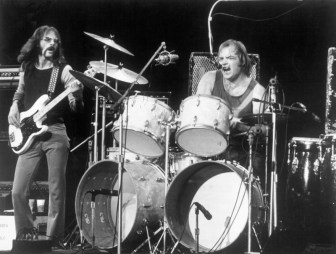 Do you think the collapse of the major recording labels is a kind of justice for their corporate greed all these years?
Do you think the collapse of the major recording labels is a kind of justice for their corporate greed all these years?
The record companies used to give you the money to go to a recording studio and they would promote the record. As time went on, the artists started to make their recordings themselves in their own little studio. With social media, Twitter, Facebook, all those recording artists learned how to promote their product. So, they just didn’t need the record companies anymore. Record companies don’t make the money they used to, so some of them closed down. Under the current situation, if I want to make a record, I can make a record without a record company and sometimes promotion of the record is easier to do it yourself with social media. The days that the record companies spending a lot of money for you, are gone. Some of the big artists don’t get record company promotion anymore. So, things are changing. It’s ok, if they ‘ll change with us. A couple of friends of mine who make records, they just finish the song and they put it out on iTunes, Facebook, Twitter, CD Baby and SoundExchange. People just have big different ways now.
You spend a lot of time with your grandchild. Does it help you to remain creative?
Songs right now, are a little different from a long time ago. A long time ago, we wrote songs about how pretty your girl is. Now, there are different things like my album “It Is What It Is”. There are a lot of different kinds of songs on it. My grandson, I love him to pieces but he is not the inspiration to me to write songs. Not yet, he’s not. But I love him and we have a good time. I like to see him, but he doesn’t live here. He lives in Denver, Colorado. It’s about a 12-hour car ride.
Did you like Levon Helm of The Band? Had you ever met him?
Levon Helm? “Up on Cripple Creek”! Unfortunately, he passed away. Levon was very good, yeah. I saw him yesterday playing with the Ringo Starr Band. We met one time but it was just a “Hi, how are you?”, we shook hands and we both went wherever we went. I didn’t spend any time with him, no.
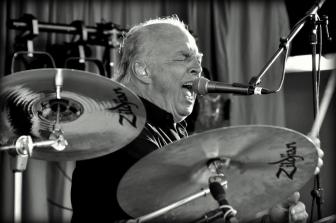 Who was the most talented person you have ever seen?
Who was the most talented person you have ever seen?
I always say that my favourite of all time is Ray Charles. Ray Charles was in my opinion, just the greatest singer. He had so much feeling and so much emotion. I just love Ray. I know there are lots of others that I care a lot about, but Ray Charles was RnB’s No1 for me.
Do you have any musical ambitions left?
Oh yeah. You know, every day. Almost every day. I have a little studio here, in my house. When I go, I‘d start to play a little bit of piano, a little of honky-tonk, coming up with ideas. I just want to keep creating. So, I do. Then I go out and I play shows too. So, I am having. I am having till I’m dead, I guess. Yeah (laughs). Hope that is not too soon.
A huge “THANK YOU” to Mr Peter Hoorelbeke for his time.
Official Peter Rivera website: https://www.peterrivera.com
